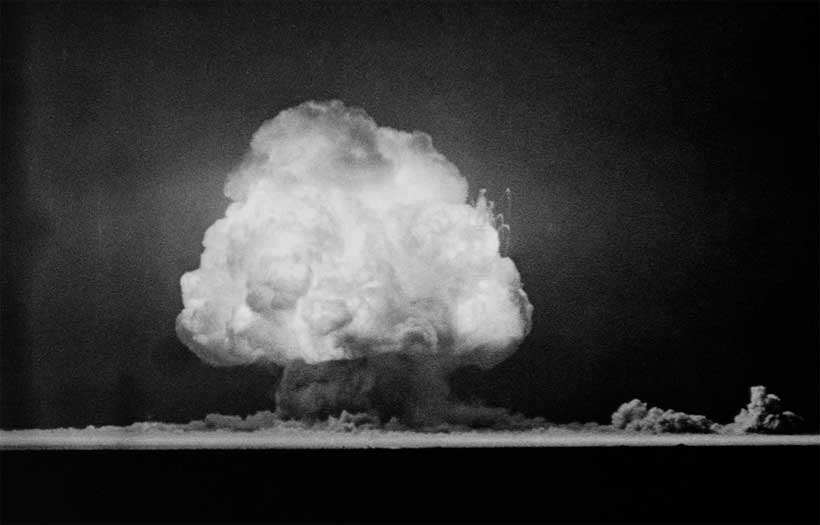Trinity test untethered the nuclear demon with potential apocalyptic power. According to United States, 1945’s Japan needed a psychological shock strong enough to make it surrender unconditionally at the cost of putting future generations on the verge of irreversible calamity. The uncertainty attached with these nuclear tests remain unpredictable even after 75 years with two devastating nuclear attacks, crises like Cuban missile crisis, and more than 2000 nuclear explosive tests. Although nuclear non-proliferation and arms control has a predominant place in nuclear realm to contain the unleashed demon with consequential threats, yet nuclear testing remained a practiced phenomenon.
Trinity test took place under strained circumstances, war pressure and complete uncertainty of results. The uncalculated risks taken at the time of first explosion and unsatisfying anti-radioactive measures following the tests were strong enough to convince the administrative and decision-making body to realize the emerging challenges in the wake of nuclear weapon discovery. Scientist are always afraid of being accused of providing mass destructive means to nations. The committee headed by German scientist James Frank issued the Frank Report, that attempted to first demonstrate the power of the weapons to members of the United Nations. Yet, there were no signs of reconsideration of retreating from use of nuclear bomb and begin with pure deterrence with just a warning of use of nukes. It was due to the fact that Truman wanted to end the war soon and maybe because Japan seemed to be stubborn enough to consider the warning.
United States reserves the pride of being an initiator nuclear weapon state with the legacy of conducting more than half of up-till-date global nuclear device tests. U.S. nuclear testing practice is on a hold since 1992 as a result of nuclear test ban treaty. Recently, U.S. officials alarmed the world with possibility of resuming nuclear weapon tests. The reasons behind are less technical -checking the reliability of nuclear stockpiles- and more political in nature. It is surely another psychological shock from the United States, this time not for any single war mongering state but the whole world.
The assumption that the U.S.’ proposed trilateral arms control initiative would get a strong base to get into reality, through the imposed political pressure on other major nuclear powers, is a mere credulity. Threat of resuming nuclear testing adds to the mistrust among the nuclear weapon states. Following U.S. footsteps, the allied nuclear weapon states could take up the same course, putting rival nations in security dilemma and the domino effect would emerge. It would further devalue the already waning and uncertain future arms control accords. The clear clash of security interests is likely to emerge as a result of United States re-testing while compelling others to follow the course. Resumption of nuclear testing by all existing nuclear weapon states would be resulting in the filling up of nuclear weapons knowledge gap that existed all long the decades providing U.S. with the edge over other nuclear weapon states.
United States needs to address the fact that as a pioneer nuclear weapon state, it is being followed by both, the competitor and friendly nuclear weapon states in its policies and nuclear strategies. Russia and China, as a result, would get more reluctant towards any trilateral approach regarding nuclear arms in near future. In emerging multipolar world post-Covid-19 crisis and potential threats of future crises situation, nuclear testing would stand as an inevitable threat. The decision of resuming nuclear testing would bring about a whole new development in nuclear realm with further weakening of the disarmament cause.


